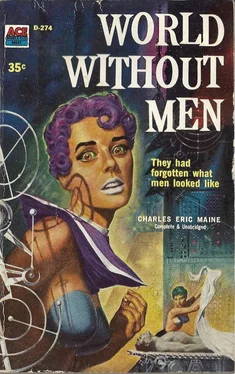Charles Maine - World Without Men
Здесь есть возможность читать онлайн «Charles Maine - World Without Men» весь текст электронной книги совершенно бесплатно (целиком полную версию без сокращений). В некоторых случаях можно слушать аудио, скачать через торрент в формате fb2 и присутствует краткое содержание. Город: New York, Год выпуска: 2013, Издательство: Ace Books, Жанр: Фантастика и фэнтези, на английском языке. Описание произведения, (предисловие) а так же отзывы посетителей доступны на портале библиотеки ЛибКат.
- Название:World Without Men
- Автор:
- Издательство:Ace Books
- Жанр:
- Год:2013
- Город:New York
- ISBN:нет данных
- Рейтинг книги:4 / 5. Голосов: 1
-
Избранное:Добавить в избранное
- Отзывы:
-
Ваша оценка:
- 80
- 1
- 2
- 3
- 4
- 5
World Without Men: краткое содержание, описание и аннотация
Предлагаем к чтению аннотацию, описание, краткое содержание или предисловие (зависит от того, что написал сам автор книги «World Without Men»). Если вы не нашли необходимую информацию о книге — напишите в комментариях, мы постараемся отыскать её.
World Without Men — читать онлайн бесплатно полную книгу (весь текст) целиком
Ниже представлен текст книги, разбитый по страницам. Система сохранения места последней прочитанной страницы, позволяет с удобством читать онлайн бесплатно книгу «World Without Men», без необходимости каждый раз заново искать на чём Вы остановились. Поставьте закладку, и сможете в любой момент перейти на страницу, на которой закончили чтение.
Интервал:
Закладка:
Gorste looked into her keen, almost eager, eyes, and nodded slowly, conscious of a strange instability in the rhythm of his heart.
“Meanwhile, Mr. Gorste, perhaps you would be kind enough to outline for us the present state of progress in the development of Sterilin.”
“All right,” Gorste murmured thoughtfully, struggling to keep his mind away from the hypnotic eyes of the woman across the table. “I will.”
VIII
Although the Biochemix building was a modern structure in austere, cubic style, E.J’s office held a dated and faintly antiquated atmosphere. It was, Gorste thought, an anachronism in the ostentatious futurist architecture of the building as a whole, but a comfortable and luxurious anachronism. The furniture was big and heavily upholstered, and the desk, in polished mahogany, had an expensive solidity that toned perfectly with the moulded ceiling and the hanging crystal chandelier. The furnishing and décor were hardly office-like at all. There was a cosy domesticity about the place, suggestive of a small drawing room. The settee, for instance, had no business in any office, and worse still, the tapestry surface bore indentations that suggested frequent use. Only the window was modern, being oblong with immense rectangular panes, but the curtains were heavy and velvety, and they were half drawn to occlude any excess of daylight.
Gorste, looking at E.J. in close-up, found himself fascinated, though he would have been hard putto define the exact nature of his fascination, or the specific features of the woman that exerted such undeniable magnetism She was mature, yet, despite her age, which so far as Gorste knew was in the late forties, (if not in the early fifties), her figure was slim and adequately shaped. Even her face, though bearing the wrinkles of advancing years, possessed an alertness, an innate liveliness, that suggested inherent youthfulness. She had poise. She dressed well in dark, slim-tapered clothes. Her hair was immaculate. The cosmetic on her face was skill fully applied, but not over-applied. She was obviously a woman who could afford to be efficiently and expensively groomed.
It was not without some misgivings that Gorste reported to her office, as requested. E.J. Wasserman, whatever her sex or appearance, was the managing director of Biochemix, and at that level, sex was a matter of negligible significance. Gorste was aware of a vaguely unpleasant feeling that he had erred — sinned against the company’s policy — in some in definable way. Perhaps it had to do with his mildly implied criticism of the projected sales promotion and advertising campaign, or it could have been the lukewarm atmosphere of his attitude towards the Sterilin research program in general. He was aware of a microscopic element of guilt, of cynical disloyalty; and now, standing face to face with the woman who was his employer, a certain sense of confusion embarrassed him.
But E. J’s smile was genuine enough, and her voice was warm and friendly.
“Please sit down, Mr. Gorste.”
Gorste sat down, uncomfortably, on a padded chair. E.J. remained standing, moving around a little, glancing at him occasionally.
“It’s a long time since we met in this office,” said E.J.
“Yes, indeed,” Gorste murmured formally, “many years, in fact.”
It had been on the occasion of his appointment as head research biochemist in the company’s laboratory. Then E.J. had said to him: “We’ve an important program of work ahead of us, Mr. Gorste, and I believe you’re the man to do it. You won’t see much of me, but I’ll be watching your work and I’m confident you will serve us well. And in return we shall pay you well.” That was so long ago it might have been a dream, but now this was the same E.J., the same in every detail, so far as Gorste could remember, but right now just a little more intimate in manner than he might have expected.
“I realize,” she said, “that a research scientist might very well be uninformed as to the commercial activities of the company for which he works.” She smiled pleasantly. “By uninformed, I mean ‘unaware’ in the sense of being other wise preoccupied. Naturally you are very much concerned in your research program; perhaps so much so that it might seem as if the research side is an end in itself, is self-sustaining.”
“It does seem that way at times,” Gorste conceded.
“In fact, Mr. Gorste, the research laboratory is a very small part of the mechanism of Biochemix. Don’t misunderstand me: small but important — extremely important. But in terms of revenue, and dividends, definitely small. Frankly, the laboratory operates at a loss, though naturally the loss is absorbed in the overall economics of the company.”
“I don’t follow,” Gorste said stubbornly. “Nearly every product this company ever marketed began life in the lab. Without the lab there would be no products and no profits.”
“Nevertheless, the lab remains non-productive in the commercial sense. It is a service, an industrial service that is expensive but essential.” E.J. crossed to the window and looked out for a moment across the massed outbuildings of the factory sloping towards the distant road. Rain fell mistily, flattening and obscuring the view. Presently, turning to Gorste, she went on: “The point I wish to make is that company policy is determined by the sales division of the company; it is based on commercial factors. For that reason it may at times seem strange, perhaps immoral, to our research staff who live in the more rarefied atmosphere of the laboratory.” Gorste noted and ignored the faint bite of sarcasm in her voice. She was silhouetted against the sky-lit rectangle of the window now, and a very fine silhouette she made, too. He forced his mind to concentrate on the exact meaning of her words.
E.J. continued: “I used the word ‘immoral’ because that was the impression I received during the conference.”
“Impression?”
“That you consider the commercial exploitation of Sterilin to be immoral.”
Gorste frowned. “Not in so many words, E.J. Frankly I don’t care what you do with the product once it has passed from the lab in a marketable form. But I thought some of the ideas put forward, particularly those to do with packaging, were rather objectionable… the compact idea, for in stance. You can’t market a medical product of this type in such a way.”
“I can and I will,” E.J. said crisply. “The moral climate of society is changing, Mr. Gorste, and changing quickly. And Sterilin itself will play an important part in stimulating the evolution of a more liberal morality.”
“That’s what I’m afraid of.”
“Afraid of?” E.J. came closer, her eyes thoughtful. “You must not confuse morality with conscience.”
Gorste smiled. “What’s the difference? My conscience tells me what is moral and what is immoral.”
E.J.’s eyebrows moved slightly, making her expression mildly quizzical. “Does it?” She crossed to the massive desk and stooped behind it, rummaging in an unseen cupboard. “Gin or whisky?” came her voice.
A succession of bottles began to appear on top of the desk. A siphon of soda water completed the array. Gorste watched in fascination at this unexpected conversion of the desk into a cocktail bar, and only when E.J. stood up and eyed him enquiringly did he remember her question.
“Gin,” he murmured apologetically, wishing immediately that he had asked for whisky, for gin always seemed to him to be an effeminate drink, even though he preferred it. “Tonic?”
“Please.”
She poured two identical drinks, and Gorste went over to the desk to take his. They stood there for a while, in the pallid window light, standing quite close to each other and sipping the colourless biting fluid. He found himself holding the steady gaze of her dark eyes without embarrassment. It was as if they were beginning to understand each other.
Читать дальшеИнтервал:
Закладка:
Похожие книги на «World Without Men»
Представляем Вашему вниманию похожие книги на «World Without Men» списком для выбора. Мы отобрали схожую по названию и смыслу литературу в надежде предоставить читателям больше вариантов отыскать новые, интересные, ещё непрочитанные произведения.
Обсуждение, отзывы о книге «World Without Men» и просто собственные мнения читателей. Оставьте ваши комментарии, напишите, что Вы думаете о произведении, его смысле или главных героях. Укажите что конкретно понравилось, а что нет, и почему Вы так считаете.












